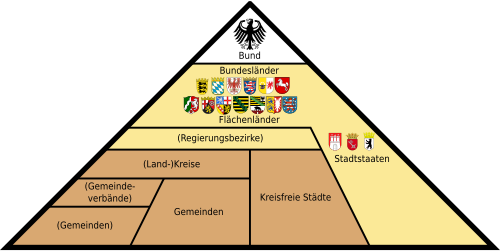Local politics in Germany
Local politics is the political work in local authorities at the local level of municipalities or cities or in rural districts and administrative districts , as well as city districts , districts or districts .
Cities and municipalities in the Federal Republic of Germany guarantee the right to municipal self-administration according to Art. 28 Paragraph 2 of the Basic Law . This allows them to regulate and decide on their own matters within the framework of the law on their own initiative. For this purpose, municipal councils and mayors are elected by the citizens . According to Article 28 Paragraph 2, Clause 2 of the Basic Law, the municipal associations (rural districts) have no jurisdiction for all matters of the local community, but only within the scope of their statutory scope of duties .
The exact form of local self-government and the organs to be elected for this are regulated in the local constitutions, the constitutions and the municipal codes of the federal states. Accordingly, the regulations differ from state to state. In the elections to the local parliaments , every resident has the right to vote for the local council as soon as they have reached the legal minimum age and are an EU citizen .
There is also the possibility of participating at the municipal level through direct democratic instruments such as referendums and referendums . In addition, there are numerous other forms and instruments of citizen participation , especially at the municipal level .
Local policy areas
Local constitutional issues and the basic structures of local financial policy are regulated by state laws. The basic conditions of other municipal political departments are also specified by state, federal and in some cases also EU law. Within this framework, the municipalities can regulate all matters of the local community themselves.
The priorities of local politics within the legal framework include the following cross-sectional areas:
- Organizational sovereignty (the freedom to decide outside of compulsory committees which municipal council committees are formed or into which offices, departments and subject areas the administration is divided)
- Personnel sovereignty
- Local financial policy (the freedom to decide on financing in your own affairs)
The main political spheres of activity are:
- Municipal building policy (resolution on the zoning plan and the development plans , definition of redevelopment areas )
- Municipal education policy (provision of buildings, non-educational staff and material resources, as well as additional care offers within the framework of the school administration )
- Local energy policy
- Local family policy
- Local health policy ( public health service , hospital sponsorship)
- Local cultural policy
- Local youth policy ( day care and day-care centers , youth work , youth protection )
- Local security and regulatory policy ( fire protection , disaster control , monitoring of stationary traffic )
- Local social policy (support of independent organizations of self-help groups and advisory services, social assistance )
- Municipal sports policy (provision of sports facilities, possibly against sports facility usage fees, grants for sports clubs and associations)
- Local environmental policy (maintenance of green spaces, sponsorship of cemeteries)
- Municipal transport policy (planning, construction and maintenance of county and township roads, street dedication and reclassifications of traffic areas, possibly Transportation (PT))
- Municipal supply and disposal policy (drinking water supply, waste disposal, sewage disposal)
- Municipal economic policy (for example: development and provision of commercial space , markets, retail concepts , tourism promotion, possibly port operations)
Some of the aforementioned policy areas are reserved for the rural districts and urban districts, and occasionally also for the large urban districts.
Violence against local politicians
The topic of violence against local politicians reached the German media at least since the murder of Walter Lübcke . The German magazine KOMMUNAL conducted surveys of local politicians in this regard, which were picked up by media such as the Tagesschau and the Frankfurter Allgemeine Zeitung . In the last survey in March 2020, 64% of those surveyed said they had already been insulted, verbally abused, threatened or attacked. In municipalities with over 5,000 inhabitants, the level rises to 70% and beyond.
See also
- State politics
- Municipal law , municipal umbrella association , municipal task structure
- Cross-border leasing , privatization , public-private partnership ,
literature
- Siegfried Frech: Local politics. Politics locally Kohlhammer, Stuttgart 2018. ISBN 978-3-17-032393-3 .
- Andreas Kost, Hans Georg Wehling (Hrsg.): Local politics in the German states. An introduction. 2nd updated and revised edition, VS Verlag für Sozialwissenschaften, Wiesbaden 2010, ISBN 978-3-531-17007-7 .
- Hans-Georg Wehling: Local politics in the Federal Republic of Germany (= contributions to contemporary history . Vol. 17). Colloquium-Verlag, Berlin 1986, ISBN 3-7678-0620-7 .
Web links
- Local political information center of the Heinrich Böll Foundation
- Kommunalweb (structured list of links on local politics by the German Institute for Urban Studies )
- Municipal Science Institute of the University of Potsdam
Individual evidence
- ↑ Local Politicians: Threats are the order of the day Local on March 10, 2020
